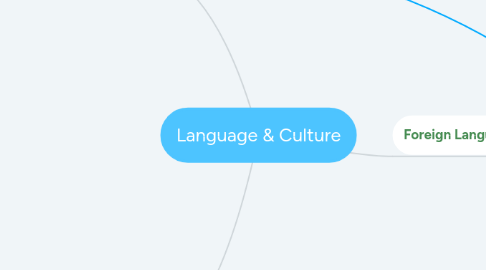
1. Intercultural Competence (IC)
1.1. ability to engage with people of another social group
1.1.1. like
1.1.1.1. People of a different town
1.1.1.2. People of different professions
1.1.1.3. Children of different ethnic group
1.1.2. they have a common identity (professionals, citizens) that help them to work together
1.1.2.1. These people might have pluricultural identities ( identification with more than one group)
1.1.3. Language is not a problem
1.2. But when Language becomes a problems
1.2.1. Intercultural Communicative Competence (ICC)
1.2.1.1. Professional Speaking different languages
1.2.1.2. children who speaks different language even when living in the same country
1.2.1.3. The relationship between Language and Culture becomes important
1.2.1.4. Communication Vr Dialogue
1.2.1.4.1. Dialogue
2. Foreign Language Education
2.1. "We learn language today for purposes of communication with native and non-native speakers" U2 A1
2.2. It develops the potential of the learner as a human being
2.3. Research
2.3.1. Empirical
2.3.2. Conceptual
2.3.3. Development of cultural netword as Cultnet
2.4. Publications involving Culture & Language
2.4.1. CEFR (Common European Freamwork of Reference for Languages: Learning, Teaching, Assessment
2.4.2. Guide for the Development and Implementation of Curricula for Plirilingual and Intecultural Education
2.4.3. European Languale Portfolio ELP
2.4.4. World Readiness Standards for Learning Languages ( Americal Council on the Teaching of Foreign Languages (ACTFL)
2.4.4.1. 5 C's
2.4.4.1.1. Cultures
2.4.4.1.2. Communication
2.4.4.1.3. Connections
2.4.4.1.4. Comparisons
2.4.4.1.5. Communities
3. Foreign Language Teacher
3.1. Sensitivity
3.1.1. Measured by the Intecultural Development Inventory ( IDI)
3.1.2. Awareness and recognition of the diversity adn otherness
3.2. Competences
3.2.1. Intercultural Understanding
3.2.1.1. "Ability to understand, appreciate and be open to various aspects and forms of cultural and social diversity
3.2.1.2. Cultural Types
3.2.1.2.1. Collectivist
3.2.1.2.2. Individualist
3.2.1.3. Cultural Comminication Styles
3.2.1.3.1. High-context
3.2.1.3.2. low-context
3.2.2. Compentences as English Speaker
3.2.3. Competences as a Teacher
3.2.3.1. Competence in the Teaching of English
3.2.3.1.1. Pragmatics
3.2.3.2. Competence in the teaching of ICC
3.2.3.2.1. Make learners intercultural investigators asking questiona and thinking more deeply about culture differenes and similarities
3.2.3.2.2. Intercultural Pedagogy
3.2.3.3. Competence managing class interaction
3.2.3.3.1. Change their classroom communication
3.2.3.4. Competences in Teaching Learning Strategies ( Startegy Instruction)
3.2.3.4.1. C-R-I-T-E-R-I-A
3.2.4. Intercultural Competence
3.2.4.1. Intercultural Communicative Competence
3.2.4.1.1. Come to understand the target language speaker's behaviour
3.2.4.2. Cultural Dimension
3.2.4.2.1. Culture Knowledge is a portion of it
3.2.4.2.2. Residence abroad is crucial?
3.2.4.2.3. Teacher training is more important?
3.2.4.3. Native Speaker vs Non Native Speakers?
3.2.4.3.1. NS are privileged in the knowdledge of Culure
3.2.4.3.2. NNS knowdledge on learners culture
3.2.4.4. Def: Ability to negotiate between language and culture
3.2.5. AssesSment
3.2.5.1. European Portfolio for Student Teachers of Languages
3.2.5.1.1. Pedagogical Competences language teqacher need
3.2.5.2. AIE Autobiography of Intercultural Encountres
3.2.6. Ethnocultural empathy
3.2.6.1. "Ability to understand the feeling of invidivuals who are ethnically /culturall y different from oneself"
3.2.7. Cognitive Flexibility
3.2.7.1. "Ability to create new categories and see more than one culturla perspective"
3.3. Personal Convictions
3.3.1. Personal Theories of Teaching
3.3.2. Their professional identities
